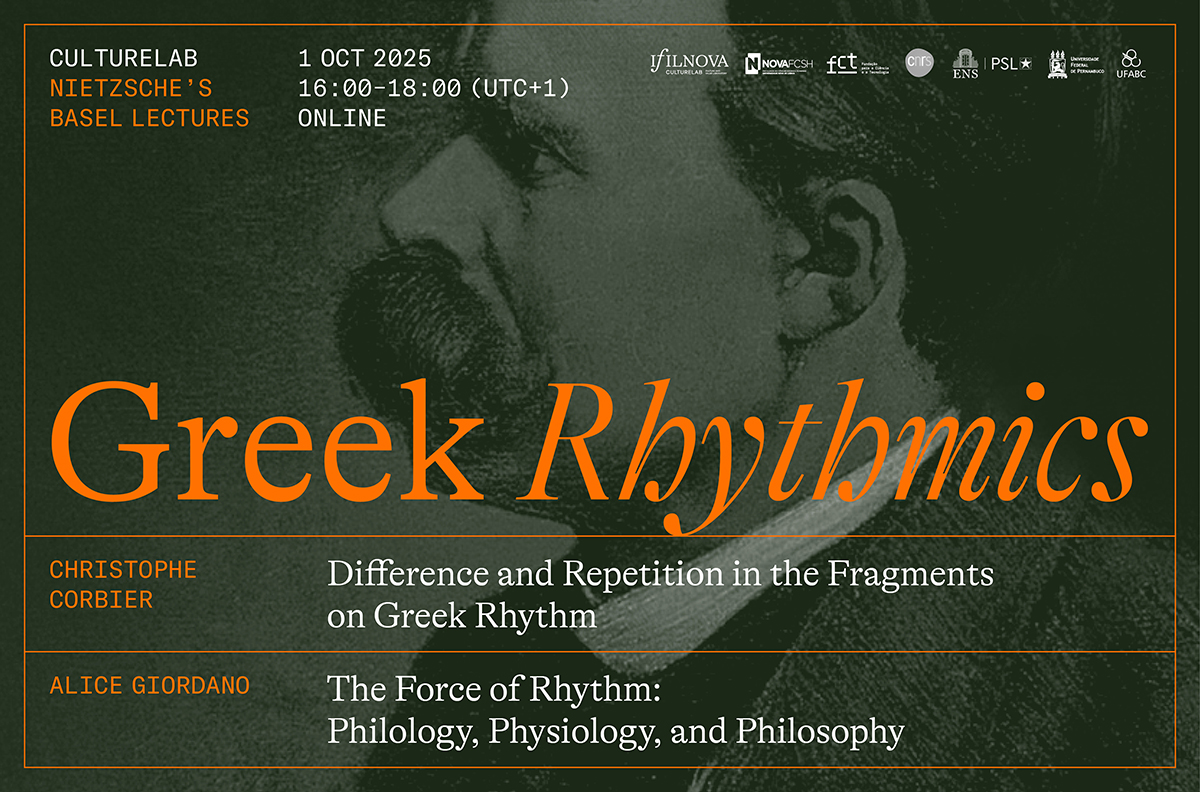Christophe Corbier & Alice Giordano

A segunda sessão do Seminário Internacional As lições nietzschianas de Basileia será dedicada ao tema Greek Rhythmics e terá lugar online no dia 1 de outubro de 2025 (Quarta-feira), das 16:00 às 18:00 (UTC+1). A sessão será conduzida por Christophe Corbier, com uma apresentação intitulada “Difference and Repetition in the Fragments on Greek Rhythm”, e Alice Giordano, que por sua vez falará sobre “The Force of Rhythm: Philology, Physiology, and Philosophy”.
Os respetivos resumos e notas biográficas estão disponíveis em inglês.
Sobre o seminário
Já é ponto assente entre os especialistas na obra de Nietzsche que as lições de Basileia são indispensáveis a uma compreensão adequada do processo de formação do seu pensamento. Depois de finalizada a publicação das lições no contexto da edição crítica das obras completas, cumpre agora estudá-las quanto às suas fontes e aos métodos nelas utilizados, bem como quanto ao seu conteúdo filológico e filosófico. Apesar disso, elas continuam a ser pouco exploradas. Se é verdade que, aqui e ali, vai surgindo alguma investigação relevante a seu respeito, esta tem-se focado sobretudo em lições específicas. Falta ainda, portanto, um trabalho de investigação que abarque todas as lições, as estude sistematicamente e nas relações que entretêm entre si, à procura de diferenças e constantes, buscando determinar a que ponto estão já presentes ou não aspectos decisivos daquilo que distingue o pensamento nietzschiano delas contemporâneo e também posterior. O presente seminário pretende ser uma primeira contribuição para preencher esta lacuna. Terá dez sessões mensais. Cada uma delas versará sobre uma das séries de lições e respectivo tema. E contará com dois oradores. Pela discussão que proporciona entre todos os participantes após cada apresentação, o formato de seminário é um modelo profícuo para se dar início a um projecto deste género. A assistência a cada sessão do seminário deverá ser precedida de registo atráves da entrada em contacto com um dos organizadores, que se responsabilizará pelo envio da respectiva hiperligação (carlottasantini@hotmail.it, enasser@uol.com.br, plima@fcsh.unl.pt). Para mais informações, veja-se abaixo o programa completo do seminário.
Org. Carlotta Santini (CNRS/ENS, Paris), Eduardo Nasser (UFPE/UFABC), Paulo Lima (IFILNOVA/NOVA FCSH)
Próximas sessões
Sessão 3: Encyclopedia of Classical Philology
5 novembro 2025 (Quarta-feira), 16:00–18:00 (UTC)
Christian Benne, “Drives: Romantic Reflections in Encyclopädie der klassischen Philologie”
James Porter, “Thinking Backwards: Theocrasy and Syncretism in The Encyclopedia of Philology”
16 dezembro 2025 (excepcionalmente à terça-feira), 16:00–18:00 (UTC)
Christian Wolleck, “A Philosopher Talks About Grammar: On the Philosophical Implications of a Philological Stint”
Marina Silenzi, “Instinct, Shout and Mimicry: Toward a Genealogy of Language”
Sessão 5: The Pre-Platonic Philosophers
21 janeiro 2026 (Quarta-feira), 16:00–18:00 (UTC)
André Laks, “Two strategies in tension?”
Helmut Heit, “The Pre-Platonic Philosophers”
18 fevereiro 2026 (Quarta-feira), 16:00–18:00 (UTC)
João Constâncio, “Nietzsche on Plato’s Phaedrus and the Question of Writing”
Pieter De Corte, “Nietzsche on Plato’s Political Thought in the Basel Lectures”
18 março 2026 (Quarta-feira), 16:00–18:00 (UTC)
Luca Lupo, “Saying Yes: The Doctrine of Assent”
Stefano Busellato, TBD
15 abril 2026 (Quarta-feira), 16:00–18:00 (UTC+1)
Rogerio Lopes, “Much Ado About (Almost) Nothing: How to Avoid Philosophical Inflation of Genealogical Claims”
Aritz Pardina Herrero, “F. Nietzsche’s Rhetoric Lectures: Dating and Interrelationship (and Why These Are Important)”
13 maio 2026 (Quarta-feira), 16:00–18:00 (UTC+1)
Sotera Fornaro, TBD
Enrico Mueller, TBD
17 junho 2026 (Quarta-feira), 16:00–18:00 (UTC+1)
Gemma Adesso, “The Art of Reading and Writing”
Rafael Carrión Arias, “History of Greek Literature from 1874-76: The Origins of Genealogical Method in F. Nietzsche”

